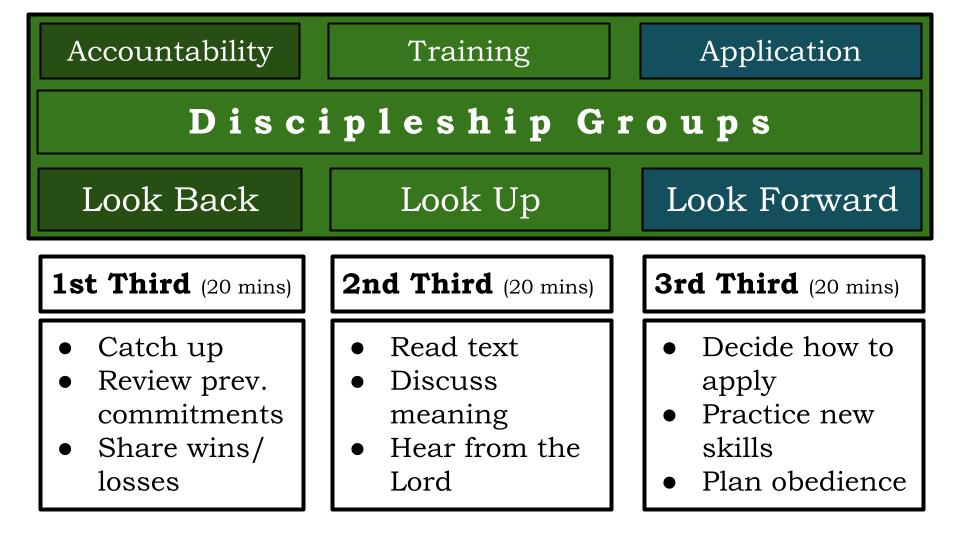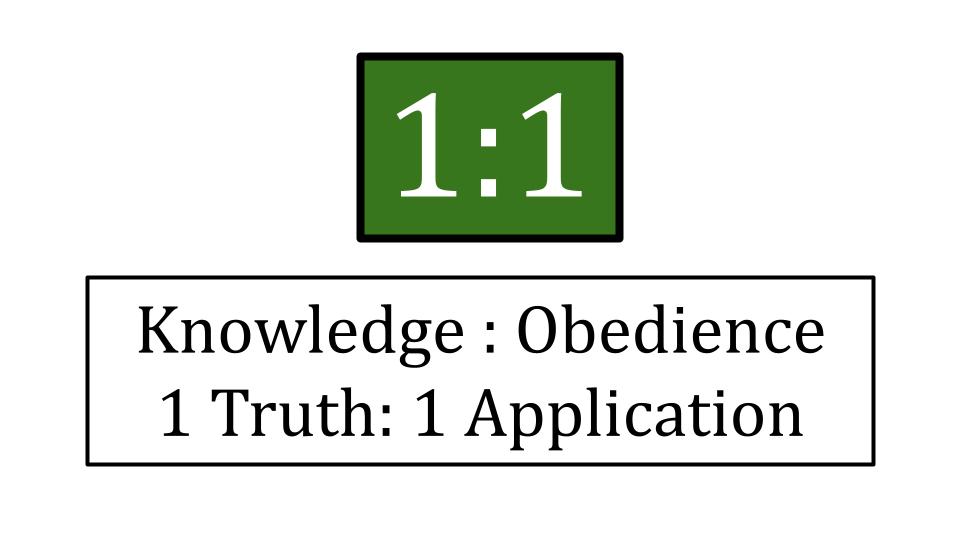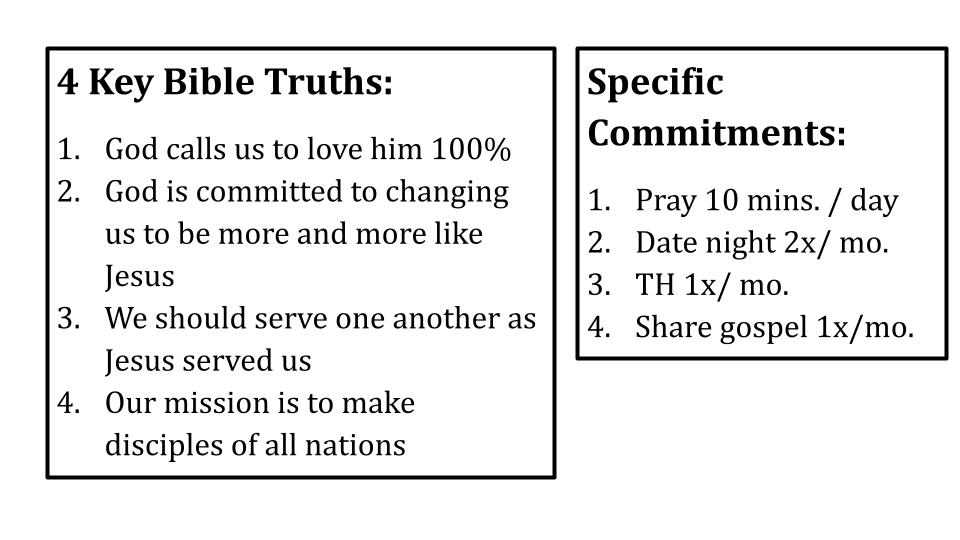Page 4/5 of Discipleship Groups at Oakwood
Page 1 – Page 2 – Page 3 – Page 4 – Page 5 / Audio / Resources
Session 4 Audio

The outcome of discipleship is OBEDIENCE – a changed life. That is what moves us forward as individual followers of Jesus and as a church – “the obedience of faith.” This is what Paul described in Romans 1. The Risen Jesus has commissioned us, Paul says, “to bring about the obedience of faith for the sake of his name among all the nations” (Rom. 1:5). Real faith acts. It obeys. It moves you forward, and that obedience of faith moves the church forward together. That is when the engine of disciplemaking starts to really hum with power – when believers come together in a commitment to deeply, radically, humbly obey Jesus.
What set in motion the Methodist movement? John and Charles Wesley with George Whitefield and one other college buddy – committing to one another to pursue holiness. Their first small group gathering they called “a holiness club.” As John Wesley preached the gospel, he set up small groups, small holiness clubs, everywhere he went, including in the U.S. – and those small discipleship groups became the Methodist Church. Have you ever wondered why we don’t have a Whitefield denomination in the U.S.? He preached here as much as Wesley and was apparently a better preacher. But he didn’t follow up his meetings with small discipleship groups. Wesley did. And the fruit of his ministry has lasted 300 years, even if it’s gotten a little twisted up in recent decades.
Obedience-based discipleship fueled the first great awakening and it has fueled every disciplemaking movement before and after that as well. Some of the most powerful movements in the world recently have been in India, and that is the basic model they use: obedience-based discipleship. They very simply train people to live as if Jesus is Lord – which means you obey Him. And they start with the Great Commission in which the Lord Jesus commands his followers to make disciples of all nations, “teaching them to obey everything I have commanded you,” sending out brand new believers to start sharing the gospel right away.
In America, we tend to train and reinforce delayed obedience, which often becomes the outright neglect of obedience. When someone becomes a believer, especially if they are coming from a “worldly” background, we usually extract them from their pre-existing relationships and surround them entirely with Christians. We spend weeks, months, even years getting them grounded in the truth of the Bible and the practices of the Christian life – like attending Sunday worship and participating in a small group of entirely Christians. And by the time we get around to teaching them to reach out with the gospel that new believer who used to be so connected with non-believers really doesn’t have any significant relationships left with those non-believers, so outreach becomes an awkward and difficult assignment. “If you loved me and this message was important, why did it take you a year or more to come share it with me?”
Discipleship Groups are our strategy to change this trend and build obedience into our culture of worship and discipleship. We say Jesus is Lord. We are hypocrites if we don’t obey Him as our Lord. To build this conviction into our discipleship process our D-Groups will follow the Three Thirds Method for our meetings.

- LOOK BACK (20 mins): Accountability. Catch up on life and review your commitments from your last meeting. What went well? What didn’t go as well? Share wins and losses. Encourage each other and pray, giving thanks for God’s all-sufficient grace!
- LOOK UP (20 mins): Training. Seek direction from God in His Word, often using a specific resource you’ve chosen for your D-Group to help you grow in a specific area. Discuss the key principles and discern the primary message of the text.
- LOOK FORWARD (20 mins): Application. Discuss how to apply the lesson you just discussed. Practice any new skills to be sure everyone is current and clear with how to implement commitments. Prayerfully plan how you will obey by writing down “I will” statements and sharing them with one another.
What DMM leaders have found is that the first and third component of this are the most important. If you have to skip one of the three thirds, the one to shorten or cut out is the middle one. Better to go back to the lesson BEFORE, if people have not yet applied it, than to go on to a new lesson.

The idea is to maintain a 1 to 1 ratio of knowledge to obedience. Lesson 1 in many places is to share the gospel with 3-5 friends or family members. The trainer doesn’t go on to Lesson 2 about prayer until the D-group members have accomplished lesson 1. Instead, they review how to share their story and God’s story, they go over the list of names each person made to share the gospel with, they pray over the list and decide which people to share with in the next week. So before teaching a Bible lesson on prayer they are modeling and teaching about prayer at the same time they are reinforcing the overall concept of obedience-based discipleship. You don’t get Truth #2 until you have obeyed Truth #1. Thus, you maintain a 1 to 1 ration of knowledge and obedience.
How much Bible knowledge do you have? I’m scared to think how much Bible knowledge I have. Let’s say you know 100 Bible truths. That means that you are responsible to obey all 100 of those truths. “With great power comes great responsibility.” Ok, that’s Spider-Man not the Bible but it’s a paraphrase of what Jesus did say: “From him to whom much is given much more will be required.” So let’s reduce our baseball diamond to four Biblical truths:

What would it look like for you to make specific commitments to APPLY those four truths to your life?
These are just examples – but the point is that they are specific, measurable, achievable, relevant and time sensitive. If you make these commitments one week, when you meet the next week you can discuss how you did. Vague goals like “pray more,” or “be more present in my neighborhood” are not specific or measurable so you and your D-Group can’t know if you are making progress.
Page 4/5 of Discipleship Groups at Oakwood – Click here for page 5
Page 1 – Page 2 – Page 3 – Page 4 – Page 5 / Audio / Resources
